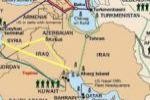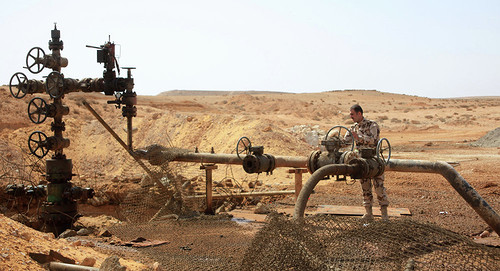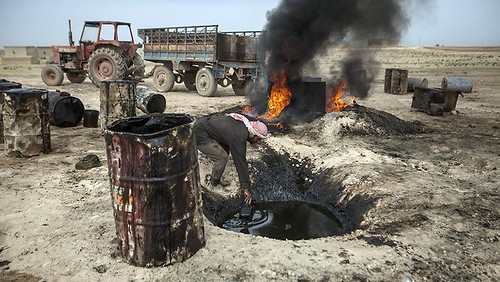Syria: Ultimate Pipelineistan War
ENERGY, MIDDLE EAST AND NORTH AFRICA, SYRIA IN CONTEXT, 14 Dec 2015
Pepe Escobar – Strategic Culture Foundation
8 Dec 2015 – Syria is an energy war. With the heart of the matter featuring a vicious geopolitical competition between two proposed gas pipelines, it is the ultimate Pipelinestan war, the term I coined long ago for the 21st century imperial energy battlefields.
It all started in 2009, when Qatar proposed to Damascus the construction of a pipeline from its own North Field – contiguous with the South Pars field, which belongs to Iran – traversing Saudi Arabia, Jordan and Syria all the way to Turkey, to supply the EU.
Damascus, instead, chose in 2010 to privilege a competing project, the $10 billion Iran-Iraq-Syria, also know as «Islamic pipeline». The deal was formally announced in July 2011, when the Syrian tragedy was already in motion. In 2012, a Memorandum of Understanding (MoU) was signed with Iran.
Until then, Syria was dismissed, geo-strategically, as not having as much oil and gas compared to the GCC petrodollar club. But insiders already knew about its importance as a regional energy corridor. Later on, this was enhanced with the discovery of serious offshore oil and gas potential.
 Iran for its part is an established oil and gas powerhouse. Persistent rumblings in Brussels – still unable to come up with a unified European energy policy after over 10 years – did account for barely contained excitement over the Islamic pipeline; that would be the ideal strategy to diversify from Gazprom. But Iran was under US and EU nuclear-related sanctions.
Iran for its part is an established oil and gas powerhouse. Persistent rumblings in Brussels – still unable to come up with a unified European energy policy after over 10 years – did account for barely contained excitement over the Islamic pipeline; that would be the ideal strategy to diversify from Gazprom. But Iran was under US and EU nuclear-related sanctions.
That ended up turning into a key strategic reason, at least for the Europeans, for a diplomatic solution to the Iranian nuclear dossier; a «rehabilitated» (to the West) Iran is able to become a key source of energy to the EU.
Yet, from the point of view of Washington, a geostrategic problem lingered: how to break the Tehran-Damascus alliance. And ultimately, how to break the Tehran-Moscow alliance.
The «Assad must go» obsession in Washington is a multi-headed hydra. It includes breaking a Russia-Iran-Iraq-Syria alliance (now very much in effect as the «4+1» alliance, including Hezbollah, actively fighting all strands of Salafi Jihadism in Syria). But it also includes isolating energy coordination among them, to the benefit of the Gulf petrodollar clients/vassals linked to US energy giants.
Thus Washington’s strategy so far of injecting the proverbial Empire of Chaos logic into Syria; feeding the flames of internal chaos, a pre-planed op by the CIA, Saudi Arabia and Qatar, with the endgame being regime change in Damascus.
An Iran-Iraq-Syria pipeline is unacceptable in the Beltway not only because US vassals lose, but most of all because in currency war terms it would bypass the petrodollar. Iranian gas from South Pars would be traded in an alternative basket of currencies.
Compound it with the warped notion, widely held in the Beltway, that this pipeline would mean Russia further controlling the gas flow from Iran, the Caspian Sea and Central Asia. Nonsense. Gazprom already said it would be interested in some aspects of the deal, but this is essentially an Iranian project. In fact, this pipeline would represent an alternative to Gazprom.
Still, the Obama administration’s position was always to «support» the Qatar pipeline «as a way to balance Iran» and at the same time «diversify Europe’s gas supplies away from Russia.» So both Iran and Russia were configured as «the enemy».
Turkey at crossroads
Qatar’s project, led by Qatar Petroleum, predictably managed to seduce assorted Europeans, taking account of vast US pressure and Qatar’s powerful lobbies in major European capitals. The pipeline would ply some of the route of a notorious Pipelineistan opera, the now defunct Nabucco, a project formerly headquartered in Vienna.
So implicitly, from the beginning, the EU was actually supporting the push towards regime change in Damascus – which so far may have cost Saudi Arabia and Qatar at least $4 billion (and counting). It was a scheme very similar to the 1980s Afghan jihad; Arabs financing/weaponizing a multinational bunch of jihadis/mercenaries, helped by a strategic go-between (Pakistan in the case of Afghanistan, Turkey in the case of Syria), but now directly fighting a secular Arab republic.
It got much rougher, of course, with the US, UK, France and Israel progressively turbo-charging all manner of covert ops privileging «moderate» rebels and otherwise, always targeting regime change.
The game now has expanded even more, with the recently discovered offshore gas wealth across the Eastern Mediterranean – in offshore Israel, Palestine, Cyprus, Turkey, Egypt, Syria, and Lebanon. This whole area may hold as much as 1.7 billion barrels of oil and up to 122 trillion cubic feet of natural gas. And that could be a mere third of the total undiscovered fossil fuel wealth in the Levant.
From Washington’s point of view, the game is clear: to try to isolate Russia, Iran and a «regime-unchanged» Syria as much as possible from the new Eastern Mediterranean energy bonanza.
And that brings us to Turkey – now in the line of fire from Moscow after the downing of the Su-24.
Ankara’s ambition, actually obsession, is to position Turkey as the major energy crossroads for the whole of the EU. 1) As a transit hub for gas from Iran, Central Asia and, up to now, Russia (the Turkish Stream gas pipeline is suspended, not cancelled). 2) As a hub for major gas discoveries in the Eastern Mediterranean. 3) And as a hub for gas imported from the Kurdistan Regional Government (KRG) in northern Iraq.
Turkey plays the role of key energy crossroads in the Qatar pipeline project. But it’s always important to remember that Qatar’s pipeline does not need to go through Syria and Turkey. It could easily cross Saudi Arabia, the Red Sea, Egypt and reach the Eastern Mediterranean.
So, in the Big Picture, from Washington’s point of view, what matters most of all, once again, is «isolating» Iran from Europe. Washington’s game is to privilege Qatar as a source, not Iran, and Turkey as the hub, for the EU to diversify from Gazprom.
This is the same logic behind the construction of the costly Baku-Tblisi-Ceyhan (BTC) pipeline, facilitated in Azerbaijan by Zbigniew «Grand Chessboard» Brzezinski in person.
As it stands, prospects for both pipelines are less than dismal. The Vienna peace process concerning Syria will go nowhere as long as Riyadh insists on keeping its weaponized outfits in the «non-terrorist» list, and Ankara keeps allowing free border flow of jihadis while engaging in dodgy business with stolen Syrian oil.
What’s certain is that, geo-economically, Syria goes way beyond a civil war; it’s a vicious Pipelineistan power play in a dizzying complex chessboard where the Big Prize will represent a major win in the 21st century energy wars.
___________________________________
Pepe Escobar, from Brazil, is the roving correspondent for Asia Times/Hong Kong, an analyst for RT and a frequent contributor to websites and radio shows ranging from the US to East Asia. He is the author of Globalistan: How the Globalized World is Dissolving into Liquid War (Nimble Books, 2007), Red Zone Blues: a snapshot of Baghdad during the surge (Nimble Books, 2007), and Obama does Globalistan (Nimble Books, 2009). His new book is Empire of Chaos. He may be reached at pepeasia@yahoo.com.
Go to Original – strategic-culture.org
DISCLAIMER: The statements, views and opinions expressed in pieces republished here are solely those of the authors and do not necessarily represent those of TMS. In accordance with title 17 U.S.C. section 107, this material is distributed without profit to those who have expressed a prior interest in receiving the included information for research and educational purposes. TMS has no affiliation whatsoever with the originator of this article nor is TMS endorsed or sponsored by the originator. “GO TO ORIGINAL” links are provided as a convenience to our readers and allow for verification of authenticity. However, as originating pages are often updated by their originating host sites, the versions posted may not match the versions our readers view when clicking the “GO TO ORIGINAL” links. This site contains copyrighted material the use of which has not always been specifically authorized by the copyright owner. We are making such material available in our efforts to advance understanding of environmental, political, human rights, economic, democracy, scientific, and social justice issues, etc. We believe this constitutes a ‘fair use’ of any such copyrighted material as provided for in section 107 of the US Copyright Law. In accordance with Title 17 U.S.C. Section 107, the material on this site is distributed without profit to those who have expressed a prior interest in receiving the included information for research and educational purposes. For more information go to: http://www.law.cornell.edu/uscode/17/107.shtml. If you wish to use copyrighted material from this site for purposes of your own that go beyond ‘fair use’, you must obtain permission from the copyright owner.
Read more
Click here to go to the current weekly digest or pick another article:
ENERGY:
- China Opens World’s Largest Offshore Solar Power Facility
- Nuclear Industry Takes Control of NASA
- The Nuclear Energy Dilemma: Climate Savior or Existential Threat?
MIDDLE EAST AND NORTH AFRICA:
- The Deafening Silence: Arab Complicity and the Normalization of Evil in Gaza
- How Arab-Muslim Leaders Betrayed the People
- Thirty Years of Middle East Lies just Keep Coming Back to Haunt Us
SYRIA IN CONTEXT:


